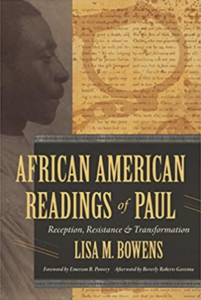About African American Readings of Paul
A Conversation with Lisa Bowens
Every Voice: What led you to write this book? What problem or issue(s) are you seeking to address?
Lisa Bowens: The idea for this book came about while I was working on my dissertation on 2 Corinthians 12, Paul’s ascent to the third heaven, which became my first book, An Apostle in Battle: Paul and Spiritual Warfare in 2 Corinthians 12:1-10. I wanted to include a chapter on African American interpretations of that passage in my dissertation. My doktorvater, J. Ross Wagner, suggested that chapter should be its own separate work apart from the dissertation. About the same time this conversation was taking place, I kept attending different conferences in which the story of Howard Thurman’s grandmother, Nancy Ambrose, repeatedly came up and the assumption seemed to be that this story was the only way African Americans approached Paul and his letters (By the way I begin the book with this important and provocative story). Both of these events, my advisor’s wise suggestion and these conference meetings, converged and I began to explore African American interpretations of Paul. I expanded my research focus from 2 Corinthians 12 and decided to cover Paul more broadly. What I found was that Paul was a central figure for African Americans throughout history as indicated by the amount of times they reference or cite him and his letters. In addition, I found that a majority of these interpreters view Paul in a positive light and use him to argue for justice, freedom and equality. This book, then, is a result of that investigative journey.
EV: What is the thesis of your book?
LB: One of the ways this book is a unique and important contribution is that it is the first monograph devoted solely to investigating a historical trajectory of how African Americans have understood Paul and utilized his work in their own writings. It explores the following question: How have African Americans interpreted Paul and the Pauline epistles from the 1700s to the mid-twentieth century? In the monograph, I examine primary texts that range from petitions to sermons, essays, and autobiographies by African American women and men from across the centuries. The book also examines conversion narratives from the formerly enslaved.
EV: Who’s your target audience, and what are you most hoping they hear from it?
LB: The target audiences are seminary and divinity school students as well as congregations. I would also add that the research included in the book involves a three-layered nexus of historical, theological, and biblical work, so I hope that all of those interested in history, bible, and theology will find it compelling as well. I also wrote it hoping that churches would engage the book too. I am delighted that a number of congregations have read the book and invited me to speak with them about it.
There are a number of things I hope people take away from the book. I hope that readers will be inspired and encouraged by the African American interpreters in the monograph and their faith in God, a faith which often endured horrific circumstances. I also hope readers will draw inspiration from these interpreters’ faith in scripture’s power to speak on their behalf in their efforts to resist and protest racism and injustice. Remarkably, these interpreters did not relinquish their Christian faith even when everything around them told them to do that, but rather they found ways to hold onto their faith and to express it in a variety of forms. Relatedly, I think readers will gain a sense of the power and complexity of the black scriptural protest tradition and reap from these biblical hermeneuts interpretive ways forward for our own contexts, in which white supremacy and racism still exist. In addition, I hope that the interpreters featured in the monograph become important conversation partners in Pauline studies, protest and resistance hermeneutics, reception history, hermeneutics of trust, and the art of biblical interpretation. I think the book also affords readers the opportunity to rediscover figures they may know and discover some they do not know.
EV: Did you have any “aha” moments while writing the book?
LB: When I began to do research for the book, I thought I would be able to cover most of the material from the 1700s to the present and that I would cover most, if not all, African American interpreters who utilized Paul in their work. However, the more I did my research I realized that such an endeavor was impossible—there are too many interpreters and too many sources. That was a nice surprise! It shows that the relationship between African Americans and Paul is strong and that this relationship spans centuries and genres. As a result of all the material that is out there, I had to shorten the time frame for the book, 1700s to mid-twentieth century, and I had to limit the amount of sources and interpreters I focused on as well. I was also surprised that I did not find many African Americans who disliked Paul or rejected his letters. I discuss two such interpreters in my book, but I thought there would be more who followed this trajectory, especially considering how proponents of slavery used Paul to justify slavery.
EV: What was the most challenging part of the book to write?
LB: Reading the writings of many of these interpreters was difficult at moments because these are true historical accounts that range from enslavement to segregation. Many of the things these interpreters endured are horrendous. When reading their stories I experienced a range of emotions—sadness, disappointment, and anger. Honestly, there were moments when I had to take some time away from the work and go for a walk or debrief with family and friends. At the same time, I also experienced great inspiration and hope from these African Americans and their writings. While these texts challenged me, they filled me with hope. I was encouraged by these interpreters’ tenacity, their unshakeable faith, and their relentless belief in the power of God and the power of the gospel, if adhered to faithfully, to transform individuals, communities, and the nation. Their stories and their writings have definitely impacted me, and I hope that readers also feel connected to them when they read the book.
EV: If your book was made into a movie, what actor/actress would play the lead role?
LB: The book is about a number of black interpreters throughout history. Perhaps, some of the figures could be played by Viola Davis, Michael B. Jordan, Shemar Moore, Angela Bassett, Courtney Vance, Halle Berry, and Kerry Washington, just to name a few.
EV: What kind of seminary/church classes should assign your book?
LB: Classes on Paul, the New Testament, history of Christian interpretation, hermeneutics, African American Biblical interpretation, Women interpreters of scripture, Protest and resistance hermeneutics, reception history, biblical interpretation, and classes on racism and injustice
About Lisa Bowens

Lisa M. Bowens (PhD, Princeton Theological Seminary) is an Associate Professor of New Testament at Princeton Theological Seminary.

